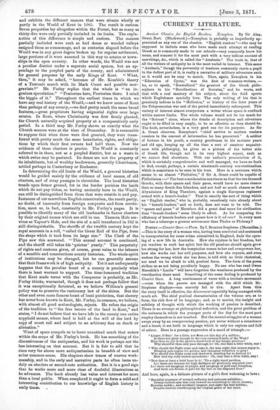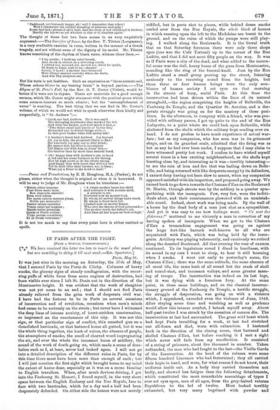Porrav.—Convict Once: a Poem. By L Branton Stephens. (Macmillan.) —This
is the story of a woman who, having been convicted and sentenced to transportation for some crime committed in England, finds the open- ing of a new life in Australia. How she rejoices in her freedom, but yet resolves to curb her spirit lest the old passions should again grow too strong for her, how the temptation comes to her and overpowers her, how she works out her evil purposes, and how she repents, and even undoes the wrong which she has done, is told with no little rhetorical, nor need we be afraid to add, poetical force. The form of the poem strikes us as not being peculiarly happy. No one who has read Owen Meredith's "Lucite" will have forgotten the weariness produced by the versification there used. Something of the same feeling is produced by Convict Once. A long continuance of verse with a trochaic movement —even when the pauses are managed with the skill which Mr.
Stephens displays—can scarcely fail to tire. Apart from this the story itself is effective, the denouement especially being managed with much art. The chief poetical characteristics of the volume are, as form, the rich flow of its language ; and, as to matter, the insight and subtlety of thought with which the working of passion is described.. There is no attempt at philosophical reflection, and the great problem of the universe in which the younger poets of the day for the most part employ themselves is not touched. But the mental struggles of a woman swept away by an overpowering passion, yet never without a conscience and a heart, is set forth in language which is only too copious and full of colour. Here is a passage expressive of a mood of triumph "Linger, 0 Bun! for a little, nor dose yet this day of a million; Is there not glory enough in the rose-curtained halls of the West ?
East thou no joy in the passion-hued folds of thy kingly pavilion ? Why should'st thou only pass through it ? Oh, rest thee a little while, rest t "Why should the Night come and take it the wan night that cannot enjoy It, Bringing pale argent for golden, and changing vermilion to grey? Why should the Night come and shadow it, entering but to destroy It? Rest 'mid thy ruby-trailed splendours! Oh, stay thee a little while, stay E.
"Rest thee at least a brief hour in it! 'Vs a right royal pavilion. La! there are thrones for high dalliance all gloriously canopied o'er! Lo! there are hangings of purple, and hangings of gold and vermilion, And there are fleeces of gold for thy feet on the diapered floor!"
And here, again, is a delicate picture of a girl's first wakening to love t
"Beautiful sequence of vermeil suffusion and paleness unbidden ; Dream-lustred eyes that look inward on something to others unseen; Reveries suddea, and maidenly languor, and sighs but half-hidden; Pensive reserve overdrooping the virginal grace of her mien.
"Saddened, yet listlessly happy, ah! well I remember that token! Well I remember the oxymel mingling of pleasure and pain !
Some face hat I gleamed upon hers, and the sleep of her childhood is broken; Hardly she knows as yet whether to rise or to slumber again."
The thought of these last two lines seems to us very exquisitely expressed.—The Sacrifice of Isaac, by the Rev. T. Tilston (Longmans), is a very creditable exercise in verse, written in the manner of a Greek tragedy, and not without some of the dignity of its model. Mr. Tilston knows something of the rhythm of blank verse, witness these lines ,—
" I lay awake; I held my rebel breath,
And shook in silence on a shivering couch,
I sobbed not, moaned not, moved not, while he spake,
Of death to Isaac, and to us.—despair. . . Barely, 0 Lord ! a mother thus bereaved Must silence meaner sorrows when she wails,
And win Thy sleepless ear."
But his taste is not faultless. Such an expression as "these accents sad, Whose echoes blister in my beating brain" is beyond pardon.—The Rhyme of St. Peter's Fall, by the Rev. G. T. Coster (Nisbet), would be better if it were not in rhyme. There are materials for a good enough sermon, which Mr. Coster might ornament with the poetical prose which some sermon-hearers so much admire ; but the "accomplishment of verse" is wanting. The best thing that we can find in Mr. Coster's volume; of which we would not wish to speak otherwise than kindly and respectfully, is " St. Andrew ":— " Quick eye had Andrew. He it was amid The thronging multitudes that marked the lad, And what his basket, and how much it had,— ' Two fishes small and loaves or barley five,' Rewarded eye, to trivial things alive,— In that poor basket what rich mercy hid
"A brother's heart had Andrew. Joy beyond All joy to him, the promised Christ to find: But heavenly joy may not to duty blind; He cannot rest, his bliss is incomplete Till Simon sits with hint at Jesus' feet,— His brother then by more than natural bond.
Oh! happy they with Andrew's eye, to heed A lad and his scant business in the throng, Nor by high scorn to do his efforts wrong. And happy they with heart that will not rest Till in their bliss their brother, too, is blest ; What joy a Peter.to the Lord to lead!"
—Poems and Translations, by A. H. Houghton, MA. (Parker), do not please, either when the thought is original or when it is borrowed. It will be easy to judge of Mr. Houghton when he translates:— ft is not too much to say that every point here is either omitted or spoilt. "matris alitur intactae
Puer-Deus sacro lacte, Bee stupenda eneculisl Esca vivit aliens Per quem cuneta manent plena, Mullis par miraculie !
Pastor carnis enutritur Vitam carnequi largitur; Matris habet gremium Quem at Petrie sollum: Virgo natum conaolatur, Et to Deem venerate." "A virgin mother bears her child And nurtures it with accents mild, A miracle to all; Nurtured now by mortal food, By whom all mortal things have stood, By whom is fixed their fall.
Cradled now on mortal breast,
Who erst the throne of God possessed,—
The mother tends the infant's cry, And fixes all her hopes on God on high."



































 Previous page
Previous page